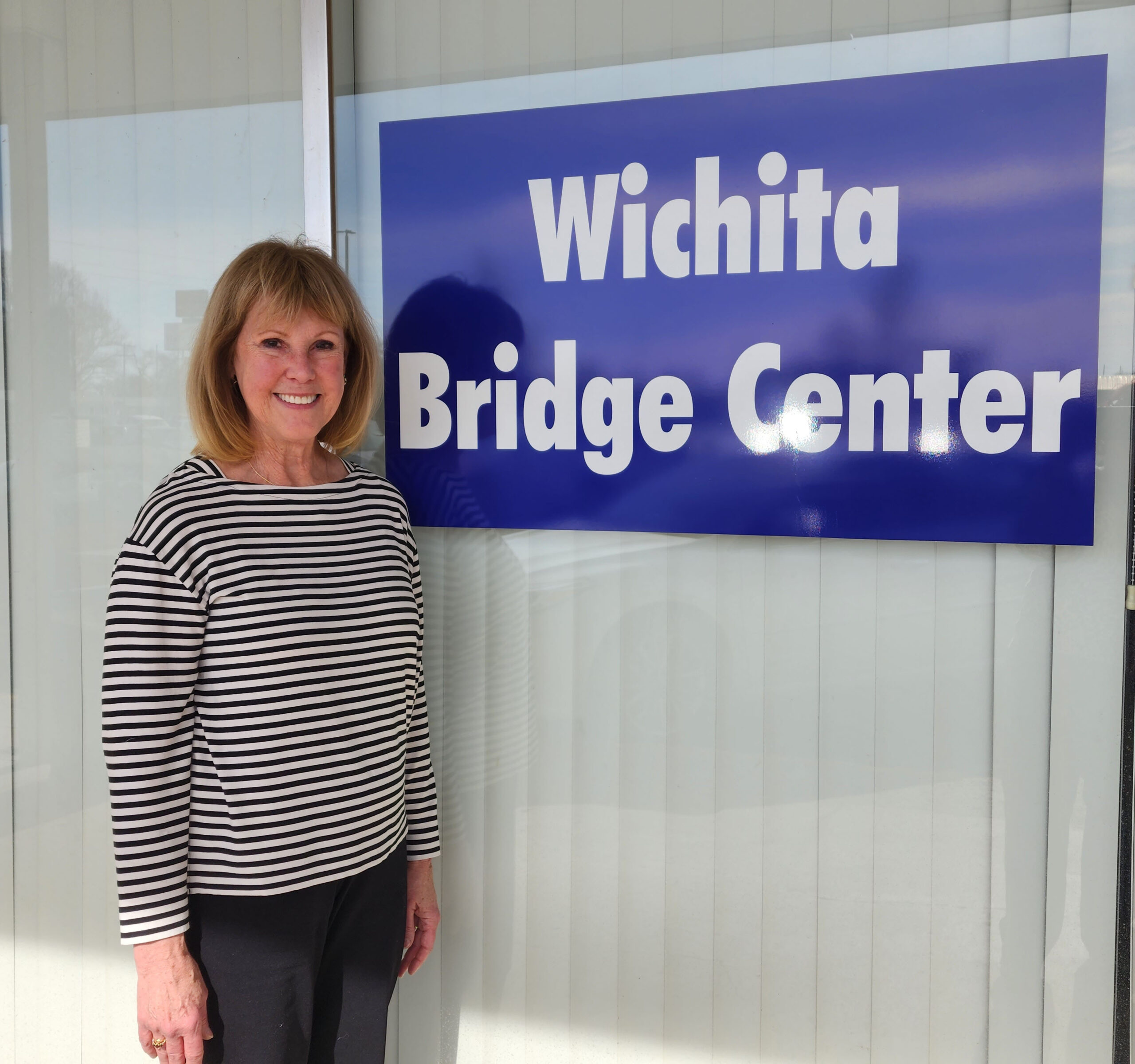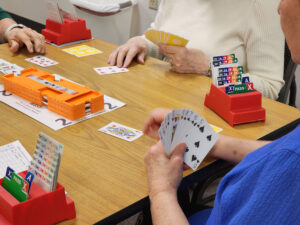Every Tuesday morning, Wanda Lonnon tries to help fellow members of the Wichita Bridge Club get better at the challenging but addictive card game. Projecting various hands on an overhead screen, Lonnon offers tips and strategies before the players move to tables where they’ll spend the next three hours or so playing.
“Can I be criticized if I make that bid?” one participant asked on a recent Tuesday, expressing the fear that likely crosses every less-experienced player’s mind.
“Oh, you can always be criticized … but if you make a mistake, it’s not like you’re on the floor dead,” Lonnon replied. “You pick yourself up and go on.”
The same could be said for the game of bridge itself. Once one of the United States’ most popular pastimes, with numerous books and newspaper columns devoted to it, bridge suffered in popularity as more forms of entertainment became available. But those who play the game say the mental stimulation it presents is unique.
“It really is the best game to keep your mind sharp,” said Mike Grommesh, noting that he’s also played Spades, Hearts, Whist and poker.
Some researchers believe bridge may delay or reduce the severity of dementia, although so far there’s no definitive proof. A 2017 study by a Scottish University found statistical evidence that bridge players feel a higher level of well-being than nonplayers due to the game’s competitive element, social component and mental challenge.
Played by two sets of partners, bridge is a trick-taking game with bidding and trump cards.
The Wichita Bridge Club meets in the Parklane Shopping Center at Lincoln and Oliver. After terminating its lease early at the beginning of the pandemic in 2020, the club returned to Parklane Center in summer 2021. While attendance has gradually been increasing and new players are joining the games, it’s still not to where it was before the pandemic, according to Mary Beck, a Wichita Bridge Club director.
That’s likely for a couple of reasons: The club requires proof of vaccination to play, and during the shutdown, several players died.
“You have to remember, these are older people who play,” said Beck.
On this particular Tuesday morning, 24 players filled six tables during the first of three games that would be played that day.
“I was told in the good old days, people used to fill 15 to 16 tables regularly,” said Beck, who started playing at the bridge center in 2015 after retiring from teaching high school in Newton.
Nancy Craig, who’s played the game since she was a teen and has been a regular at the center for the past decade, laments that the game isn’t attracting younger players. While most games are held during the day, some are held on Saturday and weeknights.
“It’s a great activity for a couple on a tight budget,” said Craig, who’s in her 70s. “It’s the best mind game I know. If I can stay on top of this, I know I’m doing good.”
Several other players agreed with Craig’s assessment of the game.
Grommesh is one of those relatively newer players at the club, although he’s far from a novice player.
Retired for seven years, he was looking for something he could do when he remembered how he loved playing bridge as a teen. To reacquaint himself with the game, about six months ago he took Beck’s beginning bridge class that she teaches at Wichita State University through its community education program. The class has become a sort of feeder for new players to the club.
Grommesh’s partner is often Judy Snowden, 82, who started attending the bridge center games when she moved to Wichita from Texas about 18 months ago.
“Now I’m here about four times a week,” she said.
Her reason for coming—the social interaction—was another often repeated by other players.
“I look forward to it so much. I have no other hobbies, and I lost all my animals,” Snowden said.
All of the games are a form of bridge called duplicate bridge, which is slightly different from party or social bridge, explained Beck. Instead of playing random hands as in regular bridge, each hand is played — or duplicated — at all of the other tables.
Many of the games are open to players of all levels, while a few are open to those who’ve accumulated a certain level of points through the game’s sanctioning body, the American Contract Bridge League.
Those points, which measure one’s achievement and skill in the game, are coveted by those who’ve joined the ACBL and earn them. (ACBL membership isn’t required to play with the Wichita Bridge Club, Beck said.)
In the short time she’s played, Snowden has accumulated 20 points.
“I think I’m doing pretty good,” she said.
She might need to pick up the pace, however, if she wants to catch longtime player David Kopper, another Wichita Bridge Club director, who has 9,400 points.
Having played since the mid-1960s, Kopper has reached the emerald life master rank, the third-highest rank in the ACBL. He and Robert Carstedt are the highest-ranking ACBL players in Wichita, according to the Wichita Bridge Club website.
The Wichita Bridge Club sponsors about a dozen games a week, with the majority taking place at the Parklane location. The remaining games are hosted by game directors at private homes, and one is held at the Regent senior living community in east Wichita.
While bridge is a partner game, some games have partners available for those players who turn up solo. Cost to play is $7 per game.
For a complete schedule of games, visit bridgewebs.com/wdb. Pre-game lessons are provided before some games. To find out more information about the games, phone numbers and emails are provided for each game’s director.
Contact Amy Geiszler-Jones at algj64@sbcglobal.net.










